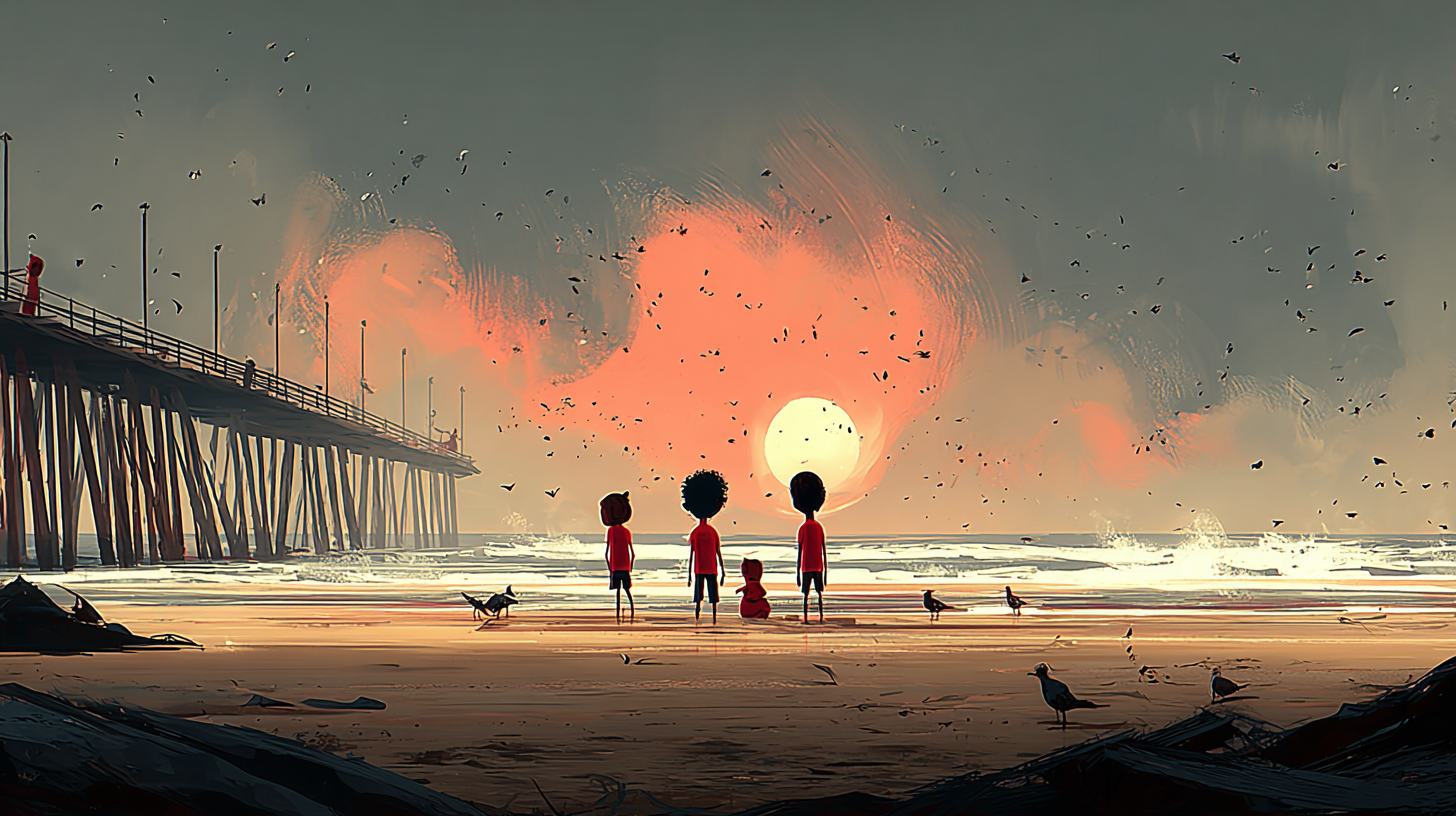Shore means the land by the water or to support something.
shore は「海や湖の岸」や「支える」という意味
以下は英単語 “shore” に関するストーリー型学習コンテンツです。まずは大枠の意味を理解して最後の文章で確認しましょう。
主な意味(main meaning)
| 品詞 | 意味 | 発音記号 | 例文 |
|---|---|---|---|
| 名詞 | 海や湖の岸、陸地 | /ʃɔːr/ | We walked along the shore at sunset. |
| 動詞 | 支える、補強する(upと共に使うことが多い) | /ʃɔːr/ | They used beams to shore up the old wall. |
語源(etymology)
古英語 scora(岸)に由来。基本イメージは「水と陸が出会う場所」。動詞の意味「支える」は「岸が大地を支える」イメージから派生。
類義語(synonyms)
| 類義語 | 意味 | 例文 |
|---|---|---|
| coast | 海岸 | We drove along the coast to see the ocean view. |
| beach | 砂浜 | Children were playing on the beach. |
| bank | 川岸 | He sat on the river bank and watched the fish. |
| support | 支える | The pillars support the roof. |
反義語(antonyms)
| 反義語 | 意味 | 例文 |
|---|---|---|
| sea | 海(岸の反対のイメージ) | Many fish live in the deep sea. |
| weaken | 弱める(支えるの反対) | The strong wind began to weaken the old bridge. |
コロケーション(collocations)
| コロケーション | 例文 |
|---|---|
| shore up | The company tried to shore up its finances. |
| on the shore | We had a picnic on the shore. |
| reach the shore | After hours of swimming, they finally reached the shore. |
| along the shore | Many hotels are built along the shore. |
2項表現(binomials)
| 2項表現 | 例文 |
|---|---|
| safe and sound | The sailors returned safe and sound to the shore. |
| trial and error | They built the boat by trial and error before it touched the shore. |
英語ストーリー(english story)
Mr. Wilson was a middle school teacher who loved the sea. Every summer, he visited the shore (/ʃɔːr/) near his hometown. The coast was quiet, and only a few families came to enjoy the beach. He liked to walk along the shore, watching the waves and the seagulls.
One year, the town had a problem. A big storm had damaged the pier. The local council wanted to shore up the old wooden pier before the tourist season. Without repair, many visitors might not come, and local shops would suffer.
Mr. Wilson’s students decided to help. They collected money and asked carpenters to fix the pier. The workers used strong beams to support the pier. Day by day, the pier looked stronger.
One afternoon, a student asked, “Teacher, what if another storm comes and weakens the pier again?” Mr. Wilson smiled. “Then we will fix it again. Life is often trial and error, but we learn and grow.”
At last, the pier was ready. When the summer festival started, people gathered on the shore. Music played, children ran on the beach, and families enjoyed food. Boats decorated with lights arrived from the sea, and everyone cheered.
When the students saw the pier standing strong, they felt proud. They had worked hard, but they returned home safe and sound, knowing they had helped their town.
和訳
ウィルソン先生は海を愛する中学校の先生でした。毎年夏、彼は故郷の近くの**岸(shore)に行きました。その海岸(coast)は静かで、少しの家族だけが砂浜(beach)に遊びに来ました。彼は岸に沿って(along the shore)**歩き、波やカモメを眺めるのが好きでした。
ある年、町に問題が起きました。大きな嵐が桟橋を壊したのです。観光シーズンの前に、町議会は古い木の桟橋を**補強する(shore up)**必要がありました。修理しなければ、観光客が来なくなり、地元の店は困るかもしれません。
ウィルソン先生の生徒たちは助けることにしました。募金を集め、大工に桟橋を直してもらうよう頼みました。大工は強い梁を使って桟橋を**支え(support)**ました。日ごとに、桟橋は丈夫になっていきました。
ある午後、生徒が聞きました。「先生、また嵐が来て桟橋を**弱めた(weaken)らどうしますか?」ウィルソン先生は笑って言いました。「その時はまた直すのです。人生は多くの場合試行錯誤(trial and error)**ですが、その中で私たちは学び成長します。」
ついに桟橋は完成しました。夏祭りの日、人々は**岸で(on the shore)集まりました。音楽が流れ、子どもたちは砂浜(beach)を走り回り、家族は食べ物を楽しみました。灯りで飾られた船が海(sea)**から到着し、みんなが歓声を上げました。
生徒たちがしっかり立つ桟橋を見たとき、誇りを感じました。彼らは一生懸命働き、無事に(safe and sound)家に帰りました。町を助けたことを知っていたからです。
Q&A
Q: shore と coast の違いは?
A: 「shore」は海・湖・川などの「岸」を広く指します。一方「coast」は特に「海岸」に限定され、海に接する陸地全体を意味します。
Q: shore と beach の違いは?
A: 「shore」は水と陸が接する場所を広く表し、岩の岸でも使えます。「beach」は砂浜に限定されるので、砂がない岸では使いません。
Q: shore と bank の違いは?
A: 「shore」は湖や海の岸に使われることが多いですが、「bank」は川の岸に使われるのが一般的です。
Q: shore up と support の違いは?
A: 「shore up」は一時的・物理的に「支える」「補強する」というニュアンスが強く、建物や制度に対してよく使います。「support」はより広い意味で「支える」で、感情や意見、人を支える場合にも使います。
Q: shore と sea の違いは?
A: 「shore」は水と接する「陸地部分」、一方「sea」は「水の広がり(海そのもの)」を指します。対になるイメージです。
Q: shore up と weaken の関係は?
A: 「shore up」は「強くする、補強する」意味で、「weaken」はその逆で「弱める」です。
Q: on the shore と along the shore の違いは?
A: 「on the shore」は「岸の上にいる・岸で」という意味。「along the shore」は「岸に沿って」という動きや並びを表します。
Q: reach the shore と on the shore の違いは?
A: 「reach the shore」は「岸にたどり着く」という動作を表し、「on the shore」はすでに「岸にいる状態」を表します。



コメント